Exact figures can be subject to interpretation (often tied to who is funding a particular study), but there is little doubt that producing new metals using circular, or scrap, commodities provides considerable energy savings. These savings come in addition to the obvious resource conservation aspects of preventing mining activities when metal is recycled.
In much of the world, these efficient and emissions-reduction friendly methods are being rewarded not only by policymakers but also with investment dollars pouring into recycling sectors. Shareholders of scrap-fed electric arc furnace (EAF) steelmakers, as one example, have greatly enjoyed their return on investment this decade.
But despite the fact world leaders met late last year to once again figure out how to support low-carbon economy activities such as recycling, some nations seem not to have received the memo.
Appearing poised to join China and Indonesia in imposing purity standards and inspection regimens that treat imported scrap as “foreign garbage” (to use the Chinese Communist Party’s term) is Malaysia. That nation has an established EAF steel sector, and in the past few years has hosted an emerging nonferrous industry. All that is at risk if the country adopts the “foreign garbage” mentality.
“New European Commission rules asking nations with less developed economies to opt in to receive scrap shipments from the EU provides further ammunition to the ‘foreign garbage’ crowd.”
Curiously enough, the European Commission has published rules to ask nations with less developed economies to opt in to receive scrap shipments from the European Union. This provides further ammunition to the “foreign garbage” crowd.
The suspicion exists that some European metal producers are happy with the EU proposal, as it could help them keep scrap materials for themselves at an artificially low price. The outcome for manufacturers and advocates of resource conservation in less developed nations is less certain.
Scrap grades that contain from 5 to 10 percent of the “wrong” materials (many of which can still be recycled) can still be separated and melted with far less energy than the iron ore used to make steel (56 to 72 percent iron) or the bauxite imported to make aluminum (30 to 50 percent aluminum).
As Murat Bayram of EMR Ltd. asked aloud during a 2021 Bureau of International Recycling online industry conversation, “Don’t other countries outside the EU have a right to sustainable [metals] production?”
Increasingly, the answer may be, “Not so readily.”
Get curated news on YOUR industry.
Enter your email to receive our newsletters.

Explore the Winter 2022 Scrap Recycling Issue
Check out more from this issue and find your next story to read.
Latest from Recycling Today
- Toppoint Holdings expands chassis fleet
- Lego creates miniature tire recycling market
- Lux Research webinar examines chemical recycling timetables
- Plastics producer tracks pulse of wire recycling market
- Republic Services, Blue Polymers open Indianapolis recycling complex
- Altilium produces EV battery cells using recycled materials
- Brightmark enters subsidiaries of Indiana recycling facility into Chapter 11
- Freepoint Eco-Systems receives $50M loan for plastics recycling facility






